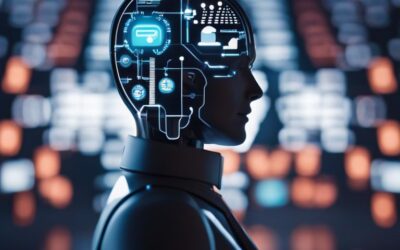With advancements in artificial intelligence, the landscape of marketing is rapidly evolving, and it’s crucial for you to stay ahead of the curve. In this blog post, we explore into how AI is revolutionizing the way businesses reach and engage with their target audience, ultimately transforming the game of marketing as we know it. So, buckle up and get ready to explore the exciting possibilities that AI brings to the table for your marketing strategies.
The Rise of AI in Marketing
Before entering into how AI is transforming the marketing landscape, let’s explore some key aspects that illustrate its impact on the industry. Here are some chatGPT prompt samples related to this subsection:
1. How is AI revolutionizing the marketing industry?
2. What are the benefits of AI in marketing?
3. Can you provide examples of successful AI marketing strategies?
The Increasing Demand for Personalization
The rise of AI has led to an increasing demand for personalization in marketing efforts. AI tools can analyze vast amounts of data to understand consumer behavior, preferences, and trends, allowing marketers to create hyper-targeted campaigns. Here are some chatGPT prompt samples related to this subsection:
1. How is AI enabling personalized marketing?
2. What role does AI play in creating targeted marketing campaigns?
3. Can you explain how AI is used to customize customer experiences?
The Need for Data-Driven Decision Making
The integration of AI in marketing has heightened the need for data-driven decision making. Marketers can now leverage AI algorithms to analyze complex data sets and derive actionable insights. This empowers businesses to make informed decisions based on real-time data, ultimately leading to more effective marketing strategies. Here are some chatGPT prompt samples related to this subsection:
1. How does AI assist in making data-driven marketing decisions?
2. What are the advantages of using AI for data analysis in marketing?
3. Can you provide examples of AI tools that facilitate data-driven decision making in marketing?
The integration of AI in marketing has revolutionized the industry, paving the way for more personalized and data-driven strategies that enhance customer experiences and drive business growth. AI has become an indispensable tool for modern marketers looking to stay ahead of the curve in a rapidly evolving digital landscape.
AI-Powered Marketing Tools
Even with the rapid advancements in AI technology, businesses are now leveraging AI-powered marketing tools to gain a competitive edge in the market. These tools automate mundane tasks, analyze complex data sets, and personalize marketing strategies to target specific audiences effectively.
Chatbots and Conversational Marketing
An important aspect of AI-powered marketing tools is the use of chatbots for conversational marketing. Chatbots are AI-driven programs that engage with customers in real-time, providing instant responses to queries and guiding them through the sales funnel. By leveraging natural language processing and machine learning algorithms, chatbots can simulate human-like conversations, providing personalized recommendations and enhancing customer experiences.
- Generate engaging conversation prompts for chatbots
- Create personalized responses for a conversational marketing campaign
- Develop a chatbot script for a customer service scenario
Predictive Analytics and Customer Segmentation
Even more powerful are AI tools that utilize predictive analytics and customer segmentation to forecast future trends and behaviors. By analyzing historical data and identifying patterns, AI can predict customers’ preferences, anticipate their needs, and segment them into specific target groups. This allows marketers to create highly tailored campaigns, send personalized recommendations, and improve overall customer satisfaction.
- Analyze customer data to predict future buying behaviors
- Segment customers based on demographic information using AI tools
- Identify trends in customer behavior through predictive analytics
Content Generation and Curation
Understanding the importance of engaging content, AI-powered marketing tools now offer capabilities for content generation and curation. These tools can create compelling blog posts, social media updates, or even video scripts by analyzing data and identifying trending topics. Additionally, AI can curate content from various sources to ensure a continuous stream of relevant and valuable information for your target audience.
- Generate blog post ideas based on trending topics in your industry
- Curate a list of articles for a content marketing campaign
- Create social media posts using AI-powered content generation tools
The Impact of AI on Marketing Strategies
Your marketing strategies are being revolutionized by the integration of artificial intelligence (AI) technologies. These advanced systems are reshaping how businesses approach customer engagement, market analysis, and brand promotion. By leveraging AI tools, you can enhance your marketing efforts, drive more personalized campaigns, and ultimately achieve better results. Below are some chatGPT prompt samples related to the impact of AI on marketing strategies:
- How is AI transforming traditional marketing practices?
- What are the key benefits of incorporating AI into marketing strategies?
- Can AI help businesses improve customer segmentation and targeting?
From Mass Marketing to Hyper-Targeting
For the past few decades, marketing has largely relied on mass communication strategies to reach a broad audience. However, with the advent of AI, there has been a significant shift towards hyper-targeted marketing. AI algorithms analyze vast amounts of data to understand consumer preferences, behavior, and demographics, allowing you to create personalized campaigns that resonate with specific target groups. This level of precision not only increases the effectiveness of your marketing efforts but also improves customer satisfaction and loyalty. Here are some chatGPT prompt samples related to the subsection ‘From Mass Marketing to Hyper-Targeting’:
- How has AI contributed to the rise of hyper-targeted marketing?
- What are the challenges associated with transitioning from mass marketing to hyper-targeting?
- Can AI help businesses tailor their marketing messages to individual consumers?
The Shift from Push to Pull Marketing
From relentless advertising to more subtle, engaging approaches, the marketing landscape has evolved from push to pull strategies. AI plays a pivotal role in this transition by enabling brands to attract consumers organically through valuable content, personalized recommendations, and interactive experiences. By deploying AI-powered tools like recommendation engines and chatbots, you can create a more dynamic and interactive relationship with your audience, fostering trust and engagement. Here are some chatGPT prompt samples related to the subsection ‘The Shift from Push to Pull Marketing’:
- How has AI facilitated the shift from push to pull marketing strategies?
- What are the advantages of implementing pull marketing techniques with AI?
- Can AI help businesses build stronger connections with their target audience?
From traditional methods to more targeted and interactive approaches, marketing strategies are undergoing a profound transformation with the integration of AI technologies. As businesses continue to adapt to this new paradigm, the possibilities for innovation and growth in the marketing landscape are endless.
AI-Driven Customer Experience
To enhance customer experience, businesses are increasingly leveraging AI technologies. These tools enable a more personalized interaction with customers, offering tailored recommendations, understanding sentiments, and providing efficient support. Here are some chatGPT prompt samples related to AI-driven customer experience:
- How can AI improve customer experience?
- What are the benefits of using AI in customer support?
- Explain how AI personalization impacts user engagement.
- Describe the role of AI in sentiment analysis for customer feedback.
- How can businesses use AI to enhance customer loyalty?
Personalized Recommendations and Offers
Personalization plays a crucial role in modern marketing strategies. By harnessing AI algorithms, businesses can analyze customer data to provide personalized recommendations and targeted offers, increasing customer engagement and improving conversion rates. Here are some chatGPT prompt samples related to personalized recommendations and offers:
- How does AI enable personalized recommendations in e-commerce?
- Explain the importance of personalized offers for customer satisfaction.
- What are the challenges of implementing AI-driven personalized recommendations?
- Discuss the ethical considerations of using AI for targeted marketing.
- How can AI algorithms enhance the effectiveness of personalized marketing campaigns?
Sentiment Analysis and Emotional Intelligence
Any interaction with customers generates valuable data that can be analyzed to understand customer sentiments and emotions. AI tools can process this data in real-time, allowing businesses to tailor their approach and responses accordingly. Here are some chatGPT prompt samples related to sentiment analysis and emotional intelligence:
- How can AI tools help businesses understand customer emotions?
- Explain the significance of sentiment analysis in social media monitoring.
- What are the benefits of incorporating emotional intelligence in customer service?
- Describe how AI-powered sentiment analysis can improve brand reputation.
- Discuss the role of empathy in AI-driven customer interactions.
For businesses, understanding and responding to customer emotions is key to building lasting relationships and fostering loyalty. Implementing AI-driven sentiment analysis tools can provide valuable insights into customer satisfaction levels, preferences, and pain points. By harnessing emotional intelligence, businesses can tailor their communication and offerings to better meet customer needs and enhance overall experience. Here are some chatGPT prompt samples related to sentiment analysis and emotional intelligence:
- How can businesses leverage AI for emotional intelligence in customer interactions?
- Explain the role of sentiment analysis in improving customer retention.
- What are the ethical considerations when using AI for emotional analysis?
- Describe a successful case study of AI-driven emotional intelligence in customer service.
- How can businesses balance automation and human touch in customer interactions?
Virtual Assistants and Customer Support
Personalized customer support is necessary for ensuring a positive customer experience. Virtual assistants powered by AI can offer real-time assistance, personalized recommendations, and efficient issue resolution. These tools streamline customer interactions, reduce response times, and enhance overall satisfaction. Here are some chatGPT prompt samples related to virtual assistants and customer support:
- How do virtual assistants enhance customer support experiences?
- Explain the benefits of AI-powered chatbots in customer service.
- What are the challenges of implementing virtual assistants in customer support?
- Describe the role of virtual assistants in omnichannel customer engagement.
- How can businesses measure the effectiveness of virtual assistant interactions?
Customer Support and Virtual Assistants
Customer support is a critical aspect of any business, and with the advancement of AI technologies, virtual assistants are revolutionizing the way companies interact with their customers. By integrating virtual assistants into their customer support systems, businesses can provide instant responses, personalized solutions, and round-the-clock assistance. These AI-powered tools not only improve efficiency but also enhance the overall customer experience by offering seamless and efficient support. Here are some chatGPT prompt samples related to virtual assistants and customer support:
- How can virtual assistants transform customer support processes?
- Explain the advantages of using AI in customer service.
- What role do virtual assistants play in enhancing customer satisfaction?
- Describe a scenario where a virtual assistant resolved a customer query effectively.
- How can businesses maintain a balance between automated responses and human touch in customer interactions?
This chapter explores how AI-driven customer experience is reshaping the marketing landscape, enabling businesses to connect with their audience on a more personalized level. From personalized recommendations to sentiment analysis and virtual assistants, AI technologies are empowering businesses to create seamless and tailored customer experiences that drive engagement and loyalty.
The Future of Work in Marketing
Once again, the landscape of work in marketing is seeing significant shifts with the integration of AI technologies. As roles evolve and new opportunities emerge, it’s crucial for professionals in the industry to stay ahead of the curve. Below are some chatGPT prompt samples related to the future of work in marketing:
- How will AI impact the job roles in marketing?
- What are the emerging skills required for marketers in the age of AI?
- How can companies ensure a smooth transition for employees into AI-integrated roles?
- What are the potential benefits and challenges of AI in marketing workforce?
Job Displacement vs. Job Creation
With the rise of AI in marketing, there is a growing concern about job displacement as automation takes over certain tasks. However, this shift also presents opportunities for new job creation in areas that require human creativity, strategic thinking, and emotional intelligence. It’s imperative for professionals to adapt and upskill to remain relevant in this changing landscape. Here are some chatGPT prompt samples related to job displacement vs. job creation:
- How can professionals future-proof their marketing careers in the age of AI?
- What are the ethical considerations surrounding AI-driven job displacement in marketing?
- How can companies balance automation with human skills to foster job creation?
- What are the new roles that may emerge in marketing as AI technologies advance?
The Rise of Hybrid Roles: Data Scientists + Marketers
On the horizon is the emergence of hybrid roles that blend the worlds of data science and marketing. Professionals who can harness the power of data analytics while understanding consumer behavior and market trends will be highly sought after. This convergence of skills is reshaping the marketing field and paving the way for innovative strategies and campaigns. Here are some chatGPT prompt samples related to the rise of hybrid roles:
- How can marketers enhance their data science skills to thrive in hybrid roles?
- What are the benefits of integrating data science expertise into marketing functions?
- How can companies attract and retain talent for hybrid data scientist-marketer positions?
- What are the key challenges professionals may face in transitioning to hybrid roles?
The Need for Continuous Learning and Adaptation
Creation of AI tools may streamline certain tasks in marketing, but it also necessitates a culture of continuous learning and adaptation among professionals. In this rapidly evolving landscape, staying updated with the latest technologies and trends is crucial to remain competitive and deliver impactful results. Here are some chatGPT prompt samples related to the need for continuous learning and adaptation:
- How can professionals stay agile in learning new marketing technologies?
- What are the benefits of fostering a culture of continuous learning in marketing teams?
- How can companies support employees in upskilling and adapting to AI-driven changes?
- What are the best practices for integrating continuous learning into marketing strategies?
Overcoming AI-Related Challenges
Unlike other technological advancements, artificial intelligence (AI) comes with its own set of challenges. As businesses increasingly rely on AI for their marketing strategies, it’s crucial to address these challenges to ensure the effectiveness and ethical use of AI in marketing. Some of the key challenges include ensuring transparency and accountability, managing bias and fairness in AI systems, and balancing human touch with automation. Let’s research deeper into each of these challenges and explore how they can be overcome.
Ensuring Transparency and Accountability
- Describe the importance of transparency in AI algorithms.
- Explain the role of ethical considerations in AI-driven marketing.
- Discuss strategies for maintaining accountability in AI-powered marketing campaigns.
One crucial aspect of AI-driven marketing is the need for transparency and accountability in how AI algorithms operate. It’s imperative for businesses to be open and honest about the use of AI in their marketing strategies. This transparency builds trust with consumers and helps them understand how AI is being used to personalize their experiences. Additionally, incorporating ethical considerations into AI-driven marketing tactics is vital to ensure that data privacy and consumer rights are respected.
Managing Bias and Fairness in AI Systems
- Explain the concept of algorithmic bias in AI systems.
- Discuss the importance of fairness and diversity in AI-driven marketing initiatives.
- Explore methods for identifying and mitigating biases in AI algorithms.
Accountability plays a significant role in addressing bias and ensuring fairness in AI systems. By holding businesses accountable for the outcomes of their AI-powered marketing campaigns, there is a greater incentive to prioritize fairness and diversity in algorithm design and implementation. This accountability fosters a more inclusive and equitable marketing landscape where all consumers are fairly represented and targeted.
Overcoming
- Discuss the benefits of combining human expertise with AI technology.
- Explore strategies for finding the right balance between human touch and automation in marketing.
- Explain how AI can enhance rather than replace human creativity in marketing campaigns.
Balancing human touch with automation is a delicate yet imperative challenge for businesses leveraging AI in their marketing efforts. While AI can analyze vast amounts of data and streamline processes, it’s crucial not to lose the human element in marketing. By combining the creativity and empathy of human marketers with the efficiency and scale of AI technology, businesses can create more personalized and impactful marketing campaigns that resonate with their target audience.
A successful AI-driven marketing strategy requires navigating through various challenges effectively to harness the full potential of AI while maintaining ethical standards and human connections in your marketing efforts.
Final Words
Drawing together all the information presented in this article, it is clear that AI is revolutionizing the field of marketing in ways we could have never imagined. From personalized advertisements to predictive analytics, AI is changing the game by providing marketers with powerful tools to better understand their target audience and deliver more impactful campaigns. As you look to the future of marketing, embracing AI technologies will be vital in staying ahead of the curve and reaching your consumers in more meaningful ways.





0 Comments